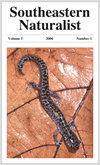佛罗里达野鸡孵化隐窝行为对雏鸟生存和巢生存的影响
IF 0.4
4区 环境科学与生态学
Q4 BIODIVERSITY CONSERVATION
引用次数: 0
摘要
对于表现出全面亲代照顾的鸟类物种(例如,孵化、育雏和羽化后的长期亲代照顾),自我保护以及幼崽的保护要求亲代鸟在每年周期的繁殖阶段具有独立但重叠的反捕食者策略。筑巢母鸡Meleagris gallopavo(野生火鸡)的行为可能会因景观特征(如道路、水源或牧场)而有所不同,这可能会影响巢中捕食者的遭遇率,从而影响巢的生存。我们评估了影响孵育期间巢和母鸡存活的因素,包括奥西奥拉野生火鸡(M.g. osceola)和东部野生火鸡(M.g. silvestris)休息行为的时间模式。我们使用了37只安装了全球定位系统(GPS)发射器的母鸡的休息时间数据,以及在佛罗里达州北部和中北部确认的54次筑巢尝试,以确定窝龄对窝存活的影响。平均而言,母鸡在上午8点至下午8点之间进行了0.89次孵化休息,通常在下午。母鸡成活率随着每天休息次数的增加、每天休息时间的延长和孵卵起始日期的推迟而增加,并且母鸡下午休息时间的延长也增加了成活率。中北部地区的巢存活率较高。这些结果表明,休息时间的增加有助于提高母鸡和巢穴的存活率,这可能是由于研究地点下午的巢穴捕食者活动减少。我们建议进一步研究捕食者活动与野生火鸡在类似于我们研究的管理土地上筑巢之间的关系。本文章由计算机程序翻译,如有差异,请以英文原文为准。
Effects of Hen Wild Turkey (Meleagris gallopavo) Incubation Recess Behavior on Survival and Nest Survival in Florida
For bird species that exhibit comprehensive parental care (e.g., incubation, brooding, and extended parental care post-fledging), protection of self, as well as juvenile offspring, requires parent birds to have separate but overlapping anti-predator strategies during reproductive phases of the annual cycle. Behavior of nesting hen Meleagris gallopavo (Wild Turkey) may vary due to landscape features (e.g., roads, water source, or pastureland), potentially influencing predator encounter rates at the nest and consequently affecting nest survival. We assessed factors affecting nest survival and hen survival during incubation, including temporal patterns of M. g. osceola (Osceola Wild Turkey) and M.g. silvestris (Eastern Wild Turkey) recess behaviors. We used data on recess bouts from 37 hens fitted with global positioning system (GPS) transmitters and 54 confirmed nest attempts in north and north-central Florida to determine the effect of nest attendance on nest survival. On average, hens took 0.89 incubation recess bouts between 0800 and 1800, usually in the afternoon. Hen survival increased with an increase in daily recess bouts, longer daily recess bouts, and later nest incubation-initiation dates, and the probability of nest survival increased when hens took longer afternoon recess bouts. Nest survival was greater in the north-central region. These results indicate increases in recess duration contribute to greater hen and nest survival, which may be due to reduced nest-predator activity in the afternoon at the study sites. We recommend additional research into the relationship between predator activity and nesting Wild Turkeys on managed lands similar to those in our study.
求助全文
通过发布文献求助,成功后即可免费获取论文全文。
去求助
来源期刊

Southeastern Naturalist
环境科学-生态学
CiteScore
1.20
自引率
16.70%
发文量
31
审稿时长
18-36 weeks
期刊介绍:
The Southeastern Naturalist covers all aspects of the natural history sciences of terrestrial, freshwater, and marine organisms and the environments of the southeastern portion of North America, roughly bounded from North Carolina south to Florida, west to Texas, north to Oklahoma, and east back to North Carolina. Manuscripts based on field studies outside of this region that provide information on species within this region may be considered at the Editor’s discretion.
 求助内容:
求助内容: 应助结果提醒方式:
应助结果提醒方式:


